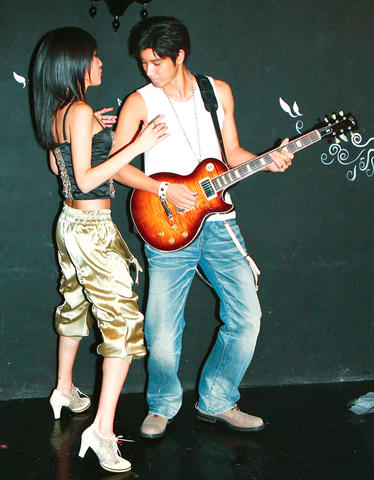Wang Lee-hom (王力宏) was said to have been tickled pink when told he was a gay man's wet dream. In a poll run by the Web site Club1069, Wang came out on top of the sausage jockeys, beating thespian Takashi Kaneshiro (金城武), Malaysian singer Prince Nicholas (張棟樑), actor Mike He (賀軍翔) and the crooner Edison Chan (陳冠希). The newly crowned Emperor of Tutti Frutti was said by Apple Daily to have worn a "proud little smile" before "thanking all gays for their support" and saying he was "honored."
"Homeboy" (as he is known to his friends) is in reality a closet womanizer and rumored to be dating Shu Qi (舒淇). The actress admitted this week in Hong Kong's Ming Pao Weekly she has a foul temper and throws her phone around when she doesn't get her own way. On the set of John Woo's (吳宇森) Blood Brothers, recently, she reportedly told the cinematographer who asked for a re-shoot: "That's not my problem. It's your problem."
Who's who in Taiwan? In addition to the usual politicians and scholars, the Encyclopedia of Taiwanese Famous People 2007 to 2008 (台灣名人百科2007-2008) has included more celebrities this year. Apparently, Lin "Ice Cream" Chi-ling (林志玲) is on her way out, as she has been concentrating on her movie career. Model Sonia Sui (隋棠) gets a mention because she's younger and prettier and is picking up more endorsements. The lying and crying Aska Yang (楊宗緯) and the partially talented Lin You-jia (林宥嘉), from the "reality show" One Million Stars (超級星光大道), were selected as "influential people."

PHOTO: TAIPEI TIMES
Jolin Tsai (蔡依林) is not about to lose her status as a diva anytime soon. She's currently shooting a NT$50 million music video that will feature 10 different countries. The vixen has trimmed her hair and squeezed herself into a revealing black cat suit for the new look. Last year she was voted the "best fake breasts" by Chinese Web site Yam. In Pop Stop's opinion, Tsai's breast augmentation was a wise choice as without it she would look like a skinny bowling pin, all waist and a little head.
Another lady famous for her enhancements is Suzanne Hsiao (蕭淑慎), who's been lying low of late ... in a rehabilitation center. The singer earlier this year blamed cosmetic surgery for a drug test that showed she had taken cocaine and ketamine. Freed from Clucker's Row she's trying to get back on the celebrity circuit, but offers have been hard to find. Which is why, perhaps, she has agreed to take off her clothes for NT$800,000. The straight-to-DVD director Wong Jing (王晶) believes she has what it takes to be Taiwan's new sex goddess, according to Apple. She has agreed in principle (if you can call it that), as long as she doesn't have to reveal her four "exposure points" (露點), namely nipples, jade palace and drug hiding hole.

May 26 to June 1 When the Qing Dynasty first took control over many parts of Taiwan in 1684, it roughly continued the Kingdom of Tungning’s administrative borders (see below), setting up one prefecture and three counties. The actual area of control covered today’s Chiayi, Tainan and Kaohsiung. The administrative center was in Taiwan Prefecture, in today’s Tainan. But as Han settlement expanded and due to rebellions and other international incidents, the administrative units became more complex. By the time Taiwan became a province of the Qing in 1887, there were three prefectures, eleven counties, three subprefectures and one directly-administered prefecture, with

President William Lai (賴清德) yesterday delivered an address marking the first anniversary of his presidency. In the speech, Lai affirmed Taiwan’s global role in technology, trade and security. He announced economic and national security initiatives, and emphasized democratic values and cross-party cooperation. The following is the full text of his speech: Yesterday, outside of Beida Elementary School in New Taipei City’s Sanxia District (三峽), there was a major traffic accident that, sadly, claimed several lives and resulted in multiple injuries. The Executive Yuan immediately formed a task force, and last night I personally visited the victims in hospital. Central government agencies and the

Among Thailand’s Chinese Nationalist Party (KMT) villages, a certain rivalry exists between Arunothai, the largest of these villages, and Mae Salong, which is currently the most prosperous. Historically, the rivalry stems from a split in KMT military factions in the early 1960s, which divided command and opium territories after Chiang Kai-shek (蔣介石) cut off open support in 1961 due to international pressure (see part two, “The KMT opium lords of the Golden Triangle,” on May 20). But today this rivalry manifests as a different kind of split, with Arunothai leading a pro-China faction and Mae Salong staunchly aligned to Taiwan.

As with most of northern Thailand’s Chinese Nationalist Party (KMT) settlements, the village of Arunothai was only given a Thai name once the Thai government began in the 1970s to assert control over the border region and initiate a decades-long process of political integration. The village’s original name, bestowed by its Yunnanese founders when they first settled the valley in the late 1960s, was a Chinese name, Dagudi (大谷地), which literally translates as “a place for threshing rice.” At that time, these village founders did not know how permanent their settlement would be. Most of Arunothai’s first generation were soldiers